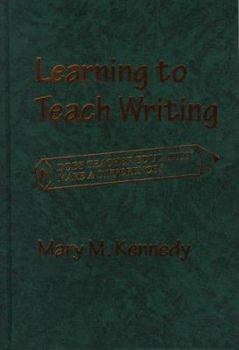Learning To Teach Writing: Does Teacher Education Make A Difference?
After decades of debate about the value of teacher education programs, this volume offers empirical evidence of how these programs actually influence new teachers and, specifically, the practice of teaching writing. The question of whether teacher education makes a difference is a perennial favorite in arguments between liberals and conservatives, but neither side has had much real evidence to support its contentions. Kennedy's study offers important findings that challenge both sides.
Unlike most large-scale studies, which survey teachers after they have completed their programs, Kennedy documents changes in young men and women from the time they enter teacher education programs through their completion of those programs. And, unlike most studies of change, this study includes a variety of teacher education programs so that changes in novices can be examined in light of the programs they attended.
Using the teaching of writing as the subject focus, this volume describes how college students think about teaching when they enter a program, shows how their thinking changes over time, and attributes the nature and direction of these changes to the content and character of the programs themselves. This book is a must-read for anyone interested in the role teacher education programs play in forming new teachers and in determining the way writing is taught in schools.





